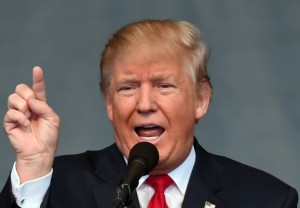
President Donald Trump continues to threaten foreign automakers, including German companies, with a border tax.
President Donald Trump continues to make veiled threats against Germany’s automakers, which are among the most successful in the world, apparently as part of a key tactic in negotiating new and more advantageous trade agreements with European countries.
“Germany has done very well in its trade deals with the U.S., and I give them credit for it,” Trump told a White House press conference. “Virtually any country we do business with — it’s not exactly good for our workers.”
“The U.S. has been treated unfairly and that’s going to stop,” he told reporters at the White House. During a meeting with representatives of both foreign and domestic car makers in Detroit last week Trump urged them to build more vehicles in the U.S.
During the speech that followed that meeting, he issued thinly veiled threat against companies that import vehicles into the U.S. — a list that includes German makers such as Volkswagen AG, BMW and Daimler AG.
“To succeed as a country, we have to work together,” he told the crowd in Ypsilanti, Michigan. “We have to fight, side-by-side, to protect our industry and to stop the jobs from leaving our country. It’s not going to happen anymore, folks.
“We’ve gone through it for many, many years, decades. It’s not going to happen anymore. And if it is, there’s consequences to pay for the companies that desert us and fire our employees. There are consequences.”
Like the “Brexit” movement that is forcing Great Britain to withdraw from the European Union, the Trump White House believes that pressuring German automakers directly and indirectly can help force trade concessions.
CNBC noted after the White House visit by German Chancellor Angela Merkel that the U.S. has no trade deals with Germany. As Merkel quickly pointed out, Germany’s trade with the U.S. is governed by rules negotiated by the European Union on behalf of member states.
If it were a single trade partner, Germany would be the fifth largest in total trade flows with the U.S. But it runs the third largest trade surplus, after China and Japan.
(CARB, EPA on track for emission showdown. Click Here for details.)
Last year, the U.S. shipped nearly $50 billion worth of goods to Germany and bought more than $114 billion in return, creating a trade deficit of nearly $65 billion.
Trump has warned German car companies he would impose a border tax of 35% on vehicles imported to the U.S. market, a plan that drew sharp rebukes from Berlin and hit the automakers’ shares. A U.S. border tax on goods shipped to the U.S. will lead to the filing of a complaint with the World Trade Organization, Germany warned.
In an interview with German newspaper Bild, published in January, Trump criticized German carmakers such as BMW, Daimler and for failing to produce more cars on U.S. soil.
“If you want to build cars in the world, then I wish you all the best. You can build cars for the United States, but for every car that comes to the USA, you will pay 35% tax,” Trump said in remarks translated into German.
“I would tell BMW that if you are building a factory in Mexico and plan to sell cars to the USA, without a 35% tax, then you can forget that,” Trump said in the Bild interview.
German car companies have avoided engaging Trump directly, preferring to say, “no comment” when asked about Trump’s statements on various issues.
(Trump announces CAFE rule review will be reopened. Click Here for the story.)
The Trump administration also kept up its attack on free trade during a meeting of finance ministers from the G20 countries that was held in Germany over the weekend. During the meeting, the United States blocked a communique in favor of free trade and condemning protectionism.
For the past decade, at the close of such meetings, G20 finance ministers have agreed to endorse free trade and oppose economic isolationism.
Meanwhile, a day after Merkel met with Trump and the pair held a joint press conference, the president took to Twitter to complain that Germany “owes vast sums of money to NATO & the United States must be paid more for the powerful, and very expensive, defense it provides to Germany!”
German Defense Minister Ursula von der Leyen rejected Trump’s claim that Germany owes NATO and the United States “vast sums” of money for defense.
“There is no debt account at NATO,” von der Leyen said in a statement, adding that it was wrong to link the alliance’s target for members to spend 2% of their economic output on defense by 2024 solely to NATO.
“Defense spending also goes into UN peacekeeping missions, into our European missions and into our contribution to the fight against IS terrorism,” von der Leyen said.
(To see why MEMA is against Trump border tax plan, Click Here.)
She said everyone wanted the burden to be shared fairly and for that to happen it was necessary to have a “modern security concept” that included a modern NATO but also a European defense union and investment in the United Nations. Her claims were supported by the former U.S. Ambassador Ivo Daalder, who suggested Trump didn’t understand how NATO worked.
